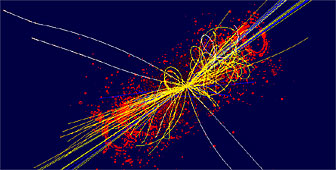Doubt over Higgs boson existence dismissed

Scientists at CERN have rubbished suggestions that the holy grail of particle physics - the Higgs boson - does not exist.
The latest edition of the “New Scientist” magazine quotes researchers who have analysed data from CERN’s Large Electron Positron (LEP) accelerator as saying the Higgs boson “probably does not exist”.
“It’s rubbish,” said John Ellis, a leading theoretical physicist at CERN, the European nuclear research centre, just outside Geneva. “The New Scientist has picked up on speculation by a couple of mavericks who don’t represent the consensus view of the community that’s working on this.
“The vast majority of physicists are convinced that the Higgs boson, or something very much like it, exists,” he told swissinfo.
The Standard Theory of Particles states that the Higgs boson explains why matter has mass. The scientific community is largely agreed that there is no plausible alternative theory.
The “God particle”
The elusive and now legendary Higgs boson is so fundamental to scientists’ understanding of matter that it has been called the “God particle”, and CERN has spent many years and a considerable amount of money trying to find it.
John Ellis said experiments at the LEP have proved that the Standard Theory of Particles works, even if the Higgs boson itself has not yet been located.
Since the LEP accelerator was closed down at the end of last year, researchers have been analysing its data. The accelerator broke up particles by smashing them into each other at incredibly high speeds.
The LEP is to be replaced by an even more powerful accelerator, the Large Hadron Collider (LHC) in 2007. This will explore an energy range that has never been studied before – a range in which John Ellis is confident the Higgs boson might be found.
He points out that the experiments conducted so far have ruled out a Higgs boson that weighs less than 100 times the mass of a proton. But if, as he suspects, the Higgs boson weights somewhere between 100 and 200 times the proton mass, the LHC should find it.
“There’s absolutely no contradiction between the so far unsuccessful searches for the Higgs boson and any theoretical notions we might have about its mass,” Ellis explained.
Towards the end of last year, a group of researchers at the LEP claimed they had found the Higgs boson, prompting CERN to delay the closure of the accelerator by a month. However, they later admitted they had botched their calculations.
by Roy Probert

In compliance with the JTI standards
More: SWI swissinfo.ch certified by the Journalism Trust Initiative
You can find an overview of ongoing debates with our journalists here. Please join us!
If you want to start a conversation about a topic raised in this article or want to report factual errors, email us at english@swissinfo.ch.